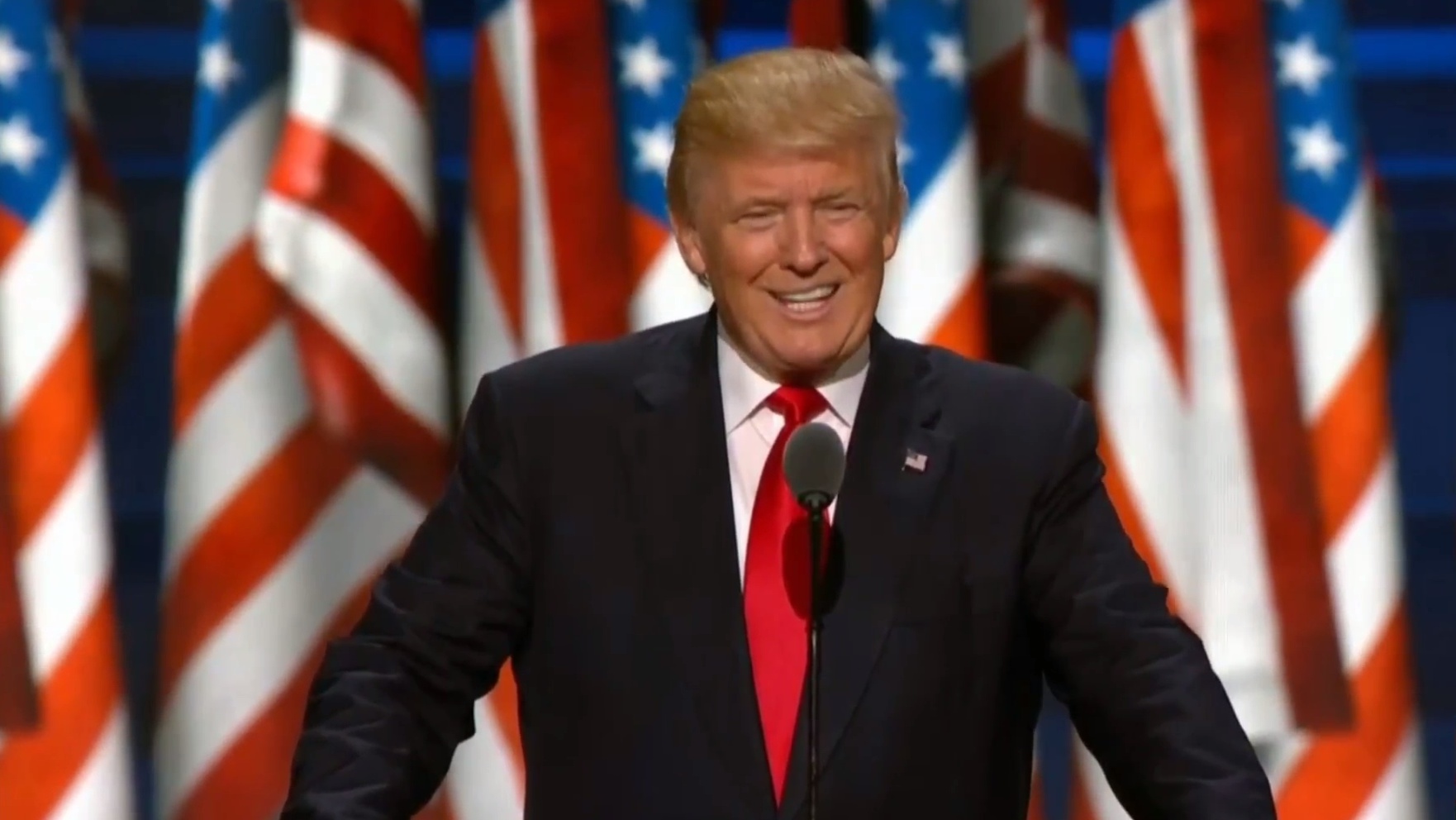In Walt Whitman’s famous poem “Song of Myself,” the unnamed gestalt narrator boasts that he “contains multitudes.” There are few actual people about whom that can be said other than Donald Trump.
The billionaire real estate developer has encouraged some of the worst racial and religious characteristics of the American Right but he is also the first truly 21st-century Republican presidential candidate.
He made it official in the speech he delivered accepting the GOP’s nomination Thursday night in Cleveland.
That dual identity was on display throughout Trump’s address as he wholeheartedly rejected conservative dogma on free trade agreements and foreign policy interventions while also affirming his desire to massively cut income taxes and overturn the Supreme Court’s generally popular ruling on same-sex marriage in Obergefell v. Hodges.
Despite his professed desire for judges in the mold of the late Antonin Scalia and his wholesale cession of the Republican Party platform committee to Christian nationalists, Trump also claimed that he would protect LGBTQ Americans and allowed billionaire supporter Peter Thiel to proclaim that he was “proud to be gay” from the main stage earlier in the evening, something that had never been done before at a Republican National Convention.
Trump’s speech was also notable for his refusal to make a hackneyed paean to the GOP’s most admired recent president, Ronald Reagan. Pundits, in their typically shallow manner, said they wished Trump had been more cheery—but anyone who actually recalls acceptance addresses of past successful nominees knows that the non-incumbent party’s words must of necessity be filled with criticism. Reagan in 1980 was far more dour than Reagan in 1984.
From a historical point of view, the most notable aspect of Trump’s discourse was its utter rejection of the rhetorical trope of genuflecting before “job creators” or the wealthy, something that every Republican nominee had done since Reagan. Mitt Romney’s entire convention in 2012 was essentially a long-running celebration of business owners. Instead, Trump made it a point to say that he was on the side of the “forgotten men and women of our country.”
While his predecessors had railed ad nauseum against “elites” in past speeches, Trump for the first time included “big business, elite media, and major donors” in the bestiary as he stated how they much preferred the policies of his opponent.
This was new and welcome territory for a Republican. Alas, however, Trump’s actual tax policies are heavily tilted toward wealthy Americans and were written by the most zealous promoters of supply-side economics.
Still there’s no doubt that big investors prefer Hillary Clinton’s trade and immigration policies over Trump’s. In this regard, Trump’s desire for a more nationalistic Republican Party is actually more conservative than the libertarian globalism which has dominated the American Right since its formation.
Also notable in the speech is that Trump removed several themes which had been commonplace in his prior addresses: a call for a complete ban on all foreign Muslims from entering the country, a claim that Mexico will pay for his border wall, and any references to his sobriquet for Clinton, “Crooked Hillary.” There was also no mention of his long-standing call for a massive deportation of all illegal immigrants.
Was Thursday’s speech an attempt to reverse some of these positions and try to occupy more centrist ground? Or was it a typical politician dodge of declining to mention unpopular positions when the populus is watching? That remains to be determined. Also up in the air is the extent to which Trump will compete for the votes of black Americans, a task that Republicans utterly abandoned when the Goldwaterites took over the party in 1964. Trump made several overtures of that nature Thursday as he talked about the systemic failure of Democrats to meet the needs of black America. He’ll have to do much more than that if he actually wants to win.
What is not open to question is Trump’s desire to move beyond at least some of American conservatives’ most unfortunate and outdated positions: anti-gay bigotry, fetishization of entrepreneurship, and the desire to rule over an ungrateful and expensive pseudo-empire.
It’s probably too late for Trump to brush aside his numerous past contradictory, racialist, and anti-Muslim statements. Had he not made them, however, he could have had a real chance in November—assuming they were not actually necessary to propel him to victory. We saw what could have been if Trump were a man of greater discipline and restraint.
Conservative elites will never forgive him, of course—and why would they? After all, Trump did not utter the word conservative even once in his acceptance speech. Not that it mattered to anyone else.
In the very near future, it will not bother the rulers of the Republican Party, either. That’s because Donald Trump has officially begun post-movement conservatism. Whether spiteful and bigoted or vigorous and compassionate, it will resemble the man who first ushered it into the world.
I wasn’t there in 1964 when Barry Goldwater and his acolytes took over the GOP. As an avid student of history, however, this moment seems all too familiar.
Though many movement conservatives wish to paper over this today, the Arizona senator’s rough-hewn campaign was frequently embarrassing and also had racist overtones. He was despised by the elites of his day and his supporters were infamous among fellow Republicans for their jackbooted behavior.
Goldwater’s candidacy crashed and burned due to its inherent flaws. Eventually, however, many of its ideals were implemented by successive presidents of both parties.
That’s because Barry Goldwater contained multitudes as well.
